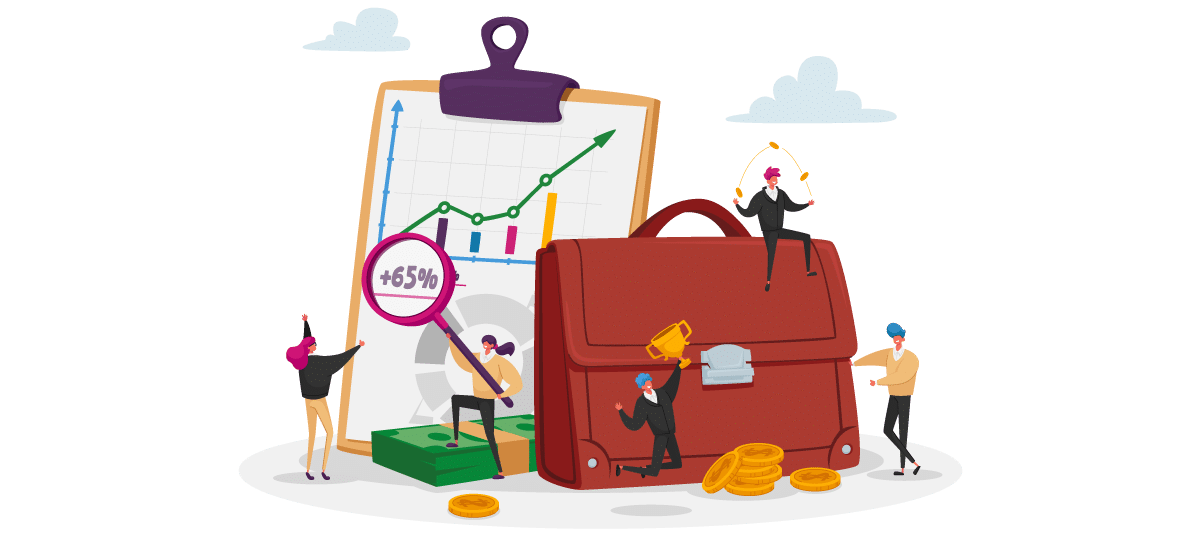What can you do to protect your assets against inflation? How can you preserve your savings in this scenario of rising prices?
The first thing you need to understand is how inflation affects your savings and assets. In a nutshell, inflation is the general increase in prices and what it does is eat into your savings. If the price of products increases, but your money does not, you are losing purchasing power. For this reason saving is not enough to secure your future.
The way to protect your wealth against inflation is clear and simple: invest your money so that, at least, it becomes profitable at the same rate as inflation.
What is not so simple or easy to discern is how, where or how much.
How much money to invest
How much of your money should you put to work to curb the effect of inflation? Neither all nor nothing, just the right amount.
And what is the right amount? Well, basically, the money that you do not need in the short term and that you have above your emergency cushion. It’s okay to worry about the effect of inflation, but you should always have liquid money to meet unforeseen expenses.
Cash is what suffers the most from the effect of inflation. However, the purpose of that part of your wealth is not to earn a return or even retain its value. Its purpose is to enable you to face unexpected situations without having to alter your savings plan or sell your assets.
Otherwise, you may need it when the markets drop and you have to sell at the worst time.
The key to that money is that it is available, not that it exceeds inflation, especially when this is 6%. From that point, any return you can obtain by guaranteeing liquidity is very welcome.
Investment options in the face of inflation
The rest of your wealth is what you have to put to work to counteract inflation. And yes, inflation is important, but it should not be the determining factor when choosing where to invest your savings.
At the end of the day, inflation is just another element of the economic landscape, which can rise and fall. The really important thing is that you define your profile as an investor. This is determined by the risk you are willing to take and your time horizon (your goals).
Depending on these two parameters, you can opt for more or less conservative investments through different products such as investment funds, unit linked funds, PIAS or pension plans (the latter are for long-term investments).
And inflation? Of course, there are investment products and strategies that work better in inflationary environments. Here are 5 investments that you can take out to protect yourself from inflation.
Real Estate Investment
Buying a house to rent out can be a way to preserve your assets in the face of rising inflation. The income generated by the rent can be updated each year with the increase in the CPI if you indicate this in the contract, so your income will be protected.
A different issue is how house prices behave in high inflation environments. Briefly, when inflation goes up, central banks usually react with a rate hike, making mortgages more expensive and reducing the amount of financing available. This translates into falling house prices or a slower increase.
However, the scenario in 2022 is slightly different and various sources have pointed out that, this year, housing may be one of the star inflation-proof investments. This is because the pandemic has delayed the purchases of many families and maximized their savings rate. Consequently, there are pending deals and people have more of their own money to make these.
The fact that the number of new housing developments has remained low and controlled has also helped the overall price of housing rise, and the forecast is that it will continue to do so.
What if you don’t have the money to buy a house to rent out? There are other ways to invest in real estate for less money and without having to buy a house.
The first would be the SOCIMI (Sociedades Anónimas Cotizadas de Inversión Inmobiliaria), or Listed Real Estate Investment Companies. These are companies specializing in the rental of real estate that is listed on the stock exchange. Investing in these means investing in flats and offices for rent.
The second is real estate crowdfunding, where there are rental, renovation and sale projects, and even new developments. Crowdfunding pools the money of many small savers to make investments.
Investment in gold (and silver)
Gold is one of the safe haven assets par excellence, but more so in times of stock market crashes than in inflationary environments.
An alternative or complement to this may be to extend the investment to other precious metals such as silver, which retains the defensive character of gold, as well as being a raw material used in industry.
Commodities
Commodities are not a traditional shelter from inflation. However, much of the current inflationary environment has to do with commodities, so it is assumed that they will reflect the price increase well.
In this context, energy is the other main cause of inflation, so oil, electricity or natural gas could be good investments that, in addition, tend to anticipate inflationary stages.
Stock market investment
Equities are the investments with the highest historical returns over the long term. Whether there is inflation or not, investing in the stock market is the star of investments over 10 years into the future.
There are several ways to invest in the stock market, from buying specific shares to doing it through investment funds, PIAS or unit linked plans. In fact, the two are completely compatible.
If you are looking for stocks that perform best with inflation, large companies that are leaders in their sector and have the power to set prices without affecting demand are the ones that do best.
Inflation-linked bonds and debentures
This type of bond is used specifically to hedge your investment against inflation. They start with an initial remuneration (like a deposit) that increases if inflation increases.
For example, a bond that offers 1% interest on 1,000 euros will give you a return of 10 euros. If inflation is 6%, that return is adjusted and will be 60 euros.
These are 5 specific investments for protecting your assets against inflation. However, the most important thing is that you understand the importance of making your savings profitable in the long term so that the increase in the cost of living does not eat up your savings.









